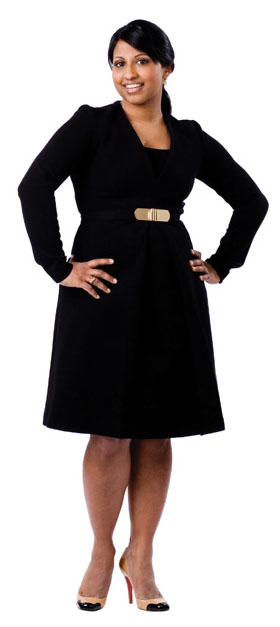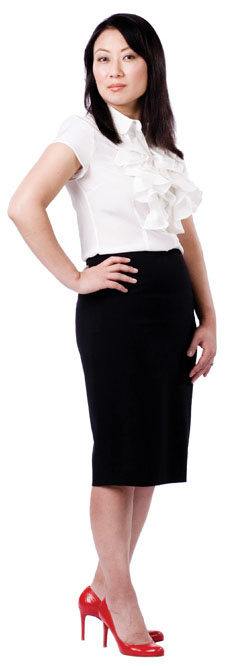Women are “leaving private practice in droves.” That was the blunt conclusion of the Law Society of Upper Canada’s Retention of Women in Private Practice Working Group last May. In response, it recommended a range of female-friendly shifts geared to keeping women from heading for the door. It’s no mystery why women leave. Private practice is notoriously life-balance-unfriendly for both genders, but even in the apparently enlightened 21st century, women carry a higher burden of family responsibilities — and starting those families often coincides with the crushing workload of an associate’s early years on the job. Little wonder that even ambitious associates are tempted by the promise of friendlier — if not necessarily richer — opportunities in government and in-house.
In the midst of this growing concern, we found three women who’ve tested their options — and decided that they belong in private practice. Here’s how they make the work they love work for them.

Samantha Prasad
Partner,
Minden Gross LLP
LL.B. Queen’s University; Ontario Bar 2000; New York State Bar 2006
Practice area: Corporate, estate, and international tax planning, succession planning 
“I’ve always been the kind of person who is involved in a lot of things. The busier I am, the more efficient I am.”
Tax geek. Sports nut. Bookworm. Those are the phrases Samantha Prasad, 36, uses to describe herself. She’s just finished writing an article recapping the highlights of the 2009 federal budget, has a copy of Man Booker Prize-winning novel White Tiger stuffed in her purse, and will be heading out to her weekly Wednesday-evening hockey game later that day. “My firm jokes that I’m NHL-bound,” she says.
Prasad, who grew up in the northern Ontario town of Cochrane (population “about 5,000”), started her law career thinking she’d work in public policy, and spent two summers at the Department of Justice. She thought she’d broaden her experience by articling in private practice and hasn’t looked back since. “I discovered I was a tax geek at heart!” she says. “The challenges, the fast pace, the client contact — I loved it.” Since then, she has co-authored two editions of Tax and Family Business Succession Planning, co-edited an impressive list of tax guides, and written regularly for leading financial newsletters.
Prasad, who is not married and doesn’t have children, admits that the challenges of juggling life and work will likely become more pronounced when that changes. “I watch and learn from friends and colleagues who’ve found ways to do it successfully, but I won’t really know until it happens,” she says. In the meantime, she turns to a network of girlfriends — some in private practice, some in-house, some in government — for inspiration. “We pick each other’s brains about how to handle issues at work and in the rest of our lives. It’s great support.”
Bernadette Corpuz
Associate,
Gowling Lafleur Henderson LLP
LL.B. University of Windsor, J.D. Detroit-Mercy;
Ontario Bar 2001
Practice Area: National energy and infrastructure

“There was a time when it would have eaten me alive to see friends make partner when I haven’t — yet. But if it takes me two or three years longer to meet my partnership goal, that’s fine.”
Bernadette Corpuz went to law school when she was 30, with an MBA and five years of government experience under her belt. Her law career began in private practice with Gowlings’ predecessor Smith Lyons. As a second-year associate, Corpuz became pregnant with her daughter Isabella. When she returned from maternity leave, she negotiated an 80 percent workload under an alternate billing arrangement. But the accommodation chafed — for Corpuz, not the firm. “I felt like I was someone who could run 10 kilometres but was only running eight.”
Maybe, she thought, private practice just wasn’t for her, and so when the opportunity to take on a general counsel position with a utility came up, she took the offer. “But I found myself missing the variety of clients and files, the challenge and creativity of private practice.” Friends said she was crazy, but she decided to opt back into private practice — and hasn’t regretted it.
“Smaller deals aren’t necessarily little deals to the people involved in them,” says Corpuz, 42. One such smaller deal: negotiating a power agreement with a Caribbean government on behalf of her client, a family-owned wind power company. “For my clients, it was a critical project. For me, it was a great opportunity to represent a client in government negotiations. And if I’d been focused only on major transactions, I might not have taken it on.” But even a workload reduction doesn’t mean a strict, shortened workweek: “When you’re negotiating, you work the same long hours any lawyer would.”
Now pregnant with twins, Corpuz says the biggest adjustment has been in managing her own competitive streak. But, she adds, “Work is not my only priority. You have to adjust how you view success.”
Jane Chung
Associate,
Miller Thomson LLP
LL.B. Osgoode Hall Law School; Ontario Bar 2002
Practice Area: Commercial real estate
 “For me, being a lawyer is a 24/7 job. I love living and breathing it. And you find ways to make it work.”
“For me, being a lawyer is a 24/7 job. I love living and breathing it. And you find ways to make it work.”
Jane Chung remembers the law school buzz about private practice: build your skills there, then head in-house, where the hours are better and you can actually have a 9-to-5 life. So after two years as an associate in private practice, when the chance came to move in-house with a major Canadian bank, it seemed like the right choice. By then, Chung already had an impressive resumé: she’d been a competitive classical piano and viola player, had interned in the office of the economic advisor to Kim Dae-Jung, President of South Korea, and done a summer clerkship at Kim & Chang, one of South Korea’s leading law firms.
The experience she gained in-house was good, she says, though the job’s “jack-of-all-trades” nature meant she missed the opportunity to focus on one area of practice. “I was working just as hard as in private practice, without the satisfaction of specializing and without a clear opportunity to move up,” says Chung, 33. Re-evaluating her goals, she realized that commercial real estate was her passion and that private practice offered her the best opportunities to shine. “So I made the move to Miller Thomson.”
Yes, the pace is busy. Yes, it helps to have a husband whose career — he’s an optometrist — allows him the flexibility to pick up some of the slack on the home front. “And technology is a godsend, because even if you’re not in the office you can still be on top of work.” It also helps not to be juggling the demands of children, yet: “If that changes and I do need more flexibility, I know the firm is open to that conversation — and that I have an extended family that is very supportive.”
Photography by Vanessa Heins
Stylist: Sarah Casselman; Hair and makeup: Victoria Fedosoff

